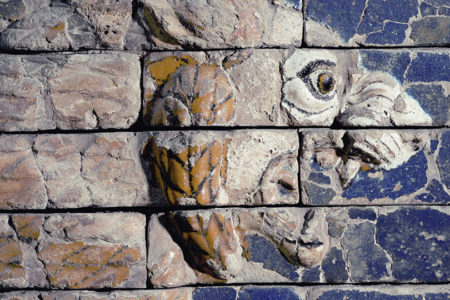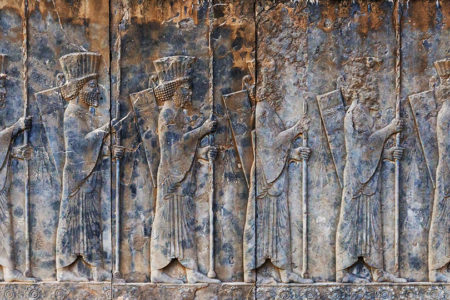Daniel and Darius
Daniel in the lions’ den (Dan. 6) is probably one of the best-known accounts in the Bible. It’s the encouraging, satisfying triumph of faith, righteousness, and justice over wickedness and evil in high places. Yet some people use it as a weapon to try to discredit the Scriptures.
Their chief quarrel is with the historicity of Darius the Mede, the king who befriended Daniel and sought unsuccessfully to keep him from being thrown to the lions. Because it was Cyrus II who conquered Babylon in 539 B.C., some claim Darius never existed or was confused with Darius I, who ruled many years later.
The Bible, however, speaks of both Cyrus and Darius. Second Chronicles 36:22 and Ezra 5:13 name Cyrus II, known as “the Great,” as the first Persian king to rule the conquered Babylonian empire. But Daniel 5:30–31 says, “In that night was Belshazzar, the king of the Chaldeans [Babylonians], slain.
And Darius, the Mede, took the kingdom, being about threescore and two [62] years old.”
So who was it—Darius or Cyrus? Who was Darius the Mede? There are two predominant views regarding his identity.
The first, and least likely, is that Darius and Cyrus are one and the same. Variations in names were common in ancient times. For example, the Greeks knew Esther’s Ahasuerus as Xerxes. Also, the word Darius could be a throne or titular name.
This view has problems, however. Darius is identified as being “of the seed of the Medes” (Dan. 9:1), while Cyrus is identified as a Persian (Dan. 6:28). Although it is true that Cyrus had a Median mother, Persian kings claimed ancestry through the father. Darius’s father was Ahasuerus (Dan. 9:1, not Esther’s Ahasuerus), while Cyrus’s father was Cambyses I.
The second, and probably correct, explanation is that Darius was Gubaru, a Mede whom Cyrus appointed to rule the province of Babylon for fourteen years.
Bible scholar John C. Whitcomb believes Darius the Mede fits the historical records related to Gubaru.1 Gubaru’s appointment also coincides with Daniel 5:31, which many scholars say is better translated “Darius received the kingdom,” rather than “Darius . . . took the kingdom.” Also, Daniel 9:1 states, Darius “was made king” (passive).
Interestingly, Gubaru is said to have been born in 601 B.C., which would have made him sixty-two, coinciding with Daniel 5:31.2 In addition, the ancient historian Flavius Josephus wrote,
Babylon was taken by Darius, and when he, with his kinsman Cyrus, had put an end to the dominion of the Babylonians, he [Darius] was sixty-two years old. He was the son of Astyages, and had another name among the Greeks.3
For many years skeptics did not believe Belshazzar existed. But they changed their minds when, in the late nineteenth century, cuneiform tablets were published that clearly referenced him. Darius the Mede stands out in Scripture as a Gentile ruler who glorified the God of Israel because of the prophet Daniel’s faithfulness. Daniel had been taken to Babylon as a mere youth in 605 B.C., during Nebuchadnezzar’s first siege of Jerusalem. He outlived the Babylonian empire and, in his eighties, rose to preeminence in the successor realm, the kingdom of the Medes and Persians. Jealous of Daniel, his coworkers decided to orchestrate his demise. They arranged the passage of an irrevocable law making it illegal to pray to anyone but the king.
Knowing the law had been passed, Daniel nevertheless continued to pray on his knees to God and was arrested. His enemies forced the unwilling Darius to throw to the lions the man he knew to be his most loyal and trusted employee. Darius’s parting words to Daniel were, “Thy God, whom thou servest continually, he will deliver thee” (Dan. 6:16). The Bible says that Darius the Mede lay awake all night, rejecting food and entertainment. Then, “very early in the morning,” he went to the lions’ den, where he cried to Daniel “with a lamentable voice” (vv. 19–20). Daniel answered. He told the king that God had sent an angel and “shut the lions’ mouths” (v. 22). When the prophet was lifted from the den, “no manner of hurt was found upon him, because he believed in his God” (v. 23).
Darius promptly tossed Daniel’s accusers, their wives, and children into the den; and before they hit the bottom, the lions ripped them to shreds (v. 24). Darius proclaimed Daniel’s God to be the “living God, and steadfast forever, and his kingdom that which shall not be destroyed, and his dominion shall be even unto the end” (v. 26).
ENDNOTE
- John C. Whitcomb, Jr., Darius the Mede: A Study in Historical Identification (Grand Rapids: Eerdmans, 1959).
- “Historical Evidence for Belshazzar & Darius the Mede,” [www.biblehistory.net/volume2/Belshazzar.htm].
- Flavius Josephus, Antiquities, 10.114.







DID DARIUS CARE ABOUT DANIEL
Thank you for this…are there records of this Darius being converted?? In Daniel, Darius the Mede wrote to all people, nations, and languages, “…for he is the living God…”
Makes me wonder if he wasn’t converted…
I love The Lord and the amazing things He does throughout history. I especially love the book of Daniel because of the glorious deeds God did for His servants throughout that book. The mightiest kings of antiquity glorified The Lord, and rightly so. Thank you for sharing this story.